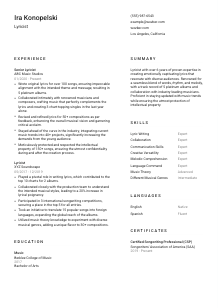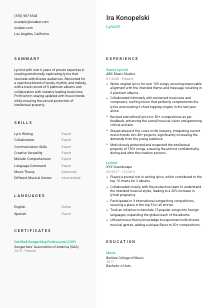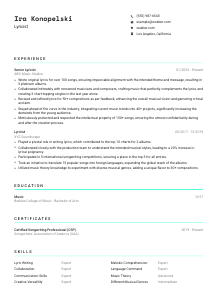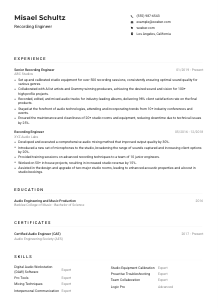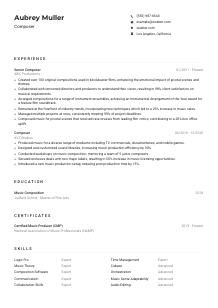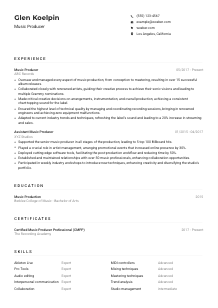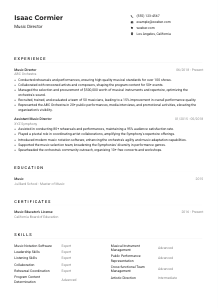Lyricist Resume Example
Weaving word symphonies, but your resume feels tone-deaf? Tune into this Lyricist resume example, orchestrated with Wozber free resume builder. See how seamlessly you can harmonize your poetic prowess with job criteria, making certain your career hits all the right notes!
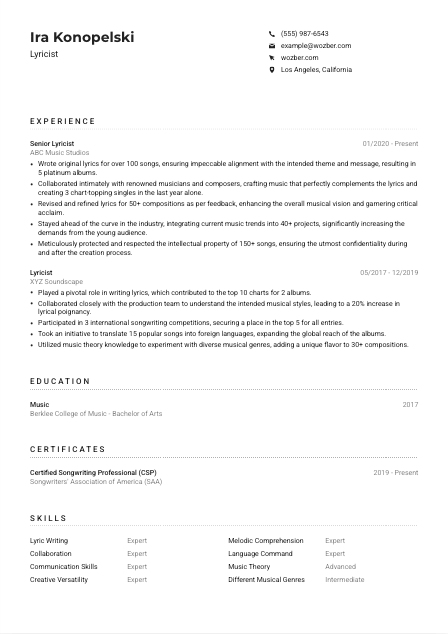
How to write a Lyricist Resume?
Hello, maestro of words! If you're looking to craft a Lyricist resume that not only showcases your talent but also sings to the tune of Applicant Tracking Systems (ATS) and potential employers, you've come to the right place. With the competitive landscape of the music industry, it's essential that your resume not only reflects your creativity but is also fine-tuned to meet the specific demands of the job you're eyeing.
In this detailed guide, we'll orchestrate your journey through the nuances of building an ATS-compliant resume that resonates with your desired Lyricist role, using the power of Wozber's free resume builder. From polishing your personal details to harmonizing your experiences with the job requirements, let's turn the page to your next chart-topping career move!
Personal Details
The Personal Details section of your resume might seem like a simple overture, but it's the opening note that can capture the attention of your audience - the hiring managers. Let's make every word count and ensure this section resonates with the rhythm of the Lyricist job you're applying for.
1. Spotlight Your Name
Your name is your headline act, so make it memorable. Consider a font that's easy on the eyes and perhaps a touch larger than the rest of your text to make sure it stands proud. Your name is the first impression on your resume, so let it shine.
2. Echo the Job Title
Below your name, make a harmonious connection by echoing the job title you're applying for - in this case, "Lyricist." This immediate identification helps set the stage for your application and aligns your introduction with the expectations of hiring managers.
3. Compose Your Contact Info
Ensure your contact information hits the right notes. Your phone number and a professional email address should be front and center. A typo here could mean a missed connection, so check, double-check, and then check again.
4. Tune into the Location Requirement
If the job has a specific location requirement, like our case study demanding someone in Los Angeles, California, make sure to include your city and state prominently. This little detail plays a big part in striking the right chord with local recruiters.
5. Link to Your Online Portfolio
In the digital age, your online presence can be a great asset. Include a link to your professional profile or personal website showcasing your portfolio. For a Lyricist, having a collection of your work easily accessible is like a back catalog of hits that recruiters can explore.
Takeaway
Think of the Personal Details section as your resume's intro riff – it sets the tone and invites the audience in. With every detail harmoniously aligned with your target role, you're not just applying; you're performing. Let's make it memorable!





Experience
The Experience section is where your resume really starts to sing. It's your chance to showcase the concerts you've headlined and the hits you've penned. We're diving deep into crafting an experience section that's not just a recollection of your past performances but a showcase of your star quality.
- Wrote original lyrics for over 100 songs, ensuring impeccable alignment with the intended theme and message, resulting in 5 platinum albums.
- Collaborated intimately with renowned musicians and composers, crafting music that perfectly complements the lyrics and creating 3 chart‑topping singles in the last year alone.
- Revised and refined lyrics for 50+ compositions as per feedback, enhancing the overall musical vision and garnering critical acclaim.
- Stayed ahead of the curve in the industry, integrating current music trends into 40+ projects, significantly increasing the demands from the young audience.
- Meticulously protected and respected the intellectual property of 150+ songs, ensuring the utmost confidentiality during and after the creation process.
- Played a pivotal role in writing lyrics, which contributed to the top 10 charts for 2 albums.
- Collaborated closely with the production team to understand the intended musical styles, leading to a 20% increase in lyrical poignancy.
- Participated in 3 international songwriting competitions, securing a place in the top 5 for all entries.
- Took an initiative to translate 15 popular songs into foreign languages, expanding the global reach of the albums.
- Utilized music theory knowledge to experiment with diverse musical genres, adding a unique flavor to 30+ compositions.
1. Dissect the Job Requirements
Begin your composition by dissecting the job description. Note the specific requirements and preferences. If it asks for "strong command of language, rhythm, and melody," make sure your roles and accomplishments reflect this symphony of skills.
2. Set the Stage with Precision
Arrange your roles and responsibilities in a chronological ensemble, with the latest showstopper at the top. For each role, ensure the title of your position, the name of the production (company), and the dates of your tour (employment period) are clearly listed.
3. Highlight Your Chart-Toppers
For each role, curate a setlist of your most impactful performances (accomplishments). If you've written lyrics that topped charts, collaborated with renowned artists, or received awards, these are your headlining acts. Be specific and use active language to convey your creative contributions.
4. Amplify with Numbers
Whenever possible, let your achievements take center stage by quantifying them. Did your lyrics contribute to platinum-selling albums? Did you collaborate on a hit that broke streaming records? Use these numbers to turn up the volume on your impact.
5. Encore Relevant Experiences Only
Keep your performance tight by including only the experiences that sing to the requirements of the Lyricist role. Ancillary roles in the music industry could be included if they directly support your expertise as a Lyricist. Remember, it's about quality, not quantity.
Takeaway
Your experience section is the climax of your resume performance. It's where you showcase your growth, creativity, and the high notes of your career. Make each point a testament to your talent and a reason for the hiring manager to want you in their ensemble. Shine bright, future Lyricist star!
Education
While a Lyricist's craft is often showcased through their words and collaborations, the Education section of your resume lays down the foundational tracks of your expertise. Let's look at how to align your educational background with the rhythm of your desired role.
1. Identify Core Requirements
The job description calls for a "Bachelor's degree in Music, English, or a related field." Start by ensuring your education reflects these requirements, spotlighting the most relevant degree that aligns with the beat of the Lyricist role.
2. Compose Your Educational Symphony
Keep your education section in tune with clarity and brevity. List your degree, field of study, institution, and graduation year in a neatly arranged score that's easy for recruiters to read and appreciate.
3. Harmonize with Relevant Studies
If your degree is directly in line with the job, like a Bachelor of Arts in Music, you're hitting the right notes. If your degree is in a related field, consider mentioning specific courses or projects that demonstrate your lyrical prowess and understanding of musical composition.
4. Feature Solo Performances
For those early in their Lyricist career or if your academic achievements closely mirror the demands of the role, spotlight significant achievements. This could include honors received, clubs or societies related to music or literature, or a thesis/project that showcases your ability to craft stories through song.
5. Continuous Learning as an Encore
The music world is ever-evolving, and so is the craft of lyric writing. If you've pursued workshops, online courses, or additional certifications that enhance your skills as a Lyricist, make sure these make an appearance. It's a nod to your commitment to staying in tune with industry advancements.
Takeaway
Your education section is the B-side of your resume – it might not get the spotlight, but it's essential to the overall album. It demonstrates your technical expertise and foundational knowledge, all while echoing the role's requirements. So, let's hit the right note and make your education resonate!
Certificates
In the diverse and competitive world of music writing, certificates can be like bonus tracks to your main album – they add value and can capture the attention of those listening (or, in this case, hiring). Let's ensure these achievements harmonize with your Lyricist aspirations.
1. Assess the Relevance
While the Lyricist job description may not outright demand specific certifications, having them can add depth to your application. Scan the job requirements and align any certifications that showcase your expertise in music theory, lyric writing, or collaboration within the music industry.
2. Curate Your Collection
Think of your certifications as limited edition releases – you want to ensure they're collector's items for the hiring manager. Prioritize those that best showcase your skills relevant to the Lyricist role. A certificate in songwriting or music theory could be exactly what catches a recruiter's eye.
3. Playback Dates Clearly
Certifications can sometimes have an expiration date, so if you're listing any that are timed (like a certified songwriting course), make sure to note when you achieved them. It demonstrates you're keeping your skills fresh and are in tune with the latest in the industry.
4. Always Ready for an Encore
The journey of a Lyricist is one of continuous growth and learning. Always be on the lookout for courses, workshops, or seminars that could bolster your credentials and, by extension, your appeal to potential employers. In the world of music and lyrics, staying relevant is key.
Takeaway
Think of your certificates as your hit singles – they stand out, they tell a compelling story, and they add to your overall appeal. Select and present them thoughtfully to add depth to your resume and to accentuate your commitment to your craft. Let your achievements sing for you!
Skills
Your skills section is where the soul of your symphony comes to life. It's your chance to highlight the unique talents you bring to the stage. As a Lyricist, your blend of creativity, collaboration, and technical knowledge is key. Let's tune in to how you can make these skills sing on your resume.
1. Uncovering Hidden Tracks
Spend some time dissecting the job description for both the explicit and implicit skills required. For a Lyricist, this could range from "strong command of language" to an "understanding of diverse musical genres." Each skill you find is a chord in the composition of your application.
2. Hit Play on Key Skills
Directly align your own skill set with those highlighted in the job description, creating a harmony that hiring managers can't ignore. Your expertise in lyric writing, melodic comprehension, and collaboration should be front and center, all tuned to the key of the Lyricist role.
3. Crafting a Tight Playlist
Resist the temptation to list every skill you possess. Instead, curate a playlist of your most compelling talents that resonate with the Lyricist position. Ensure each skill you include is a hit that reinforces your candidacy and your unique voice in the world of lyrics.
Takeaway
The Skills section is your resume's chorus, the catchy part that everyone remembers. Make sure it's unforgettable by aligning it with the needs of the job and showcasing the unique blend of creativity and technical know-how you bring. Let your skills dance off the page and into the heart of your future employer!
Languages
In the global concert hall of the music industry, speaking multiple languages can be a potent tool in your repertoire. While the immediate job description for a Lyricist may not demand multilingual skills, showcasing your linguistic versatility can set you apart as a candidate with global appeal.
1. Scan the Setlist
Initially, consider any language preferences or requirements listed in the job description. If the role specifically mentions a need for fluency in a language, that's your cue to ensure it's prominently featured in your languages section.
2. Lead with Your Headline Acts
Prioritize listing languages that are most relevant to the job and the music industry you aspire to thrive in. If you're fluent in a language that's widely spoken in your desired market, make sure it's hitting the high notes on your resume.
3. Catalog Your Linguistic Discography
Include other languages you're proficient in, arranged by fluency. This demonstrates your capability to engage with diverse audiences and collaborators, adding layers to your application that reflect a well-traveled and culturally attuned Lyricist.
4. Strike the Right Chord with Honesty
Using clear terms to describe your proficiency ensures clarity and integrity in your application. Whether it's "Native," "Fluent," "Intermediate," or "Basic," be honest about your ability to communicate, write, and comprehend in each language you list.
5. The Encore: Versatility in Verse
Given a Lyricist's role in crafting messages that resonate across borders, your multilingual abilities can be a unique selling point. Even if the job doesn't specify it, highlighting your ability to write or understand lyrics in multiple languages could be the encore that wins you the role.
Takeaway
In the composition of your resume, languages can be the quiet harmonies that enrich your main melody. They speak to your adaptability, your ability to communicate across cultures, and your potential to craft lyrics that resonate on a global stage. Let your linguistic prowess amplify your appeal as a Lyricist.
Summary
Your resume summary is the prelude to your professional symphony - a teaser that draws recruiters in and leaves them eager for more. It's your chance to encapsulate your career's narrative, highlighting the melodies and harmonies that make you an unparalleled choice for the Lyricist role.
1. Tune into the Job's Rhythm
Begin by immersing yourself in the essence of the job description. Understand what makes the role unique and how your background harmonizes with its requirements. This understanding sets the tone for a summary that's both compelling and relevant.
2. Compose Your Opening Verse
Kick off your summary with a line that encapsulates who you are as a professional. As a Lyricist, it might start with, "Crafting emotionally resonant lyrics with a proven track record of chart-topping hits..." Immediately, you're setting the stage for a narrative that highlights both your passion and success.
3. Weave in Your Greatest Hits
Highlight your core competencies and major achievements. Touch on the unique blend of creativity, technical skills, and collaborations that have marked your journey. Quantifiable successes, like platinum albums or chart-topping singles, should play a starring role in this section.
4. End on a High Note
Your summary is a crescendo, building up to leave a lasting impression. Keep it concise, encapsulating your unique value proposition as a Lyricist in just a few powerful lines. This is your chance to make the hiring manager eager to dive into the details of your resume.
Takeaway
The Summary is your resume's headline act – it captures the essence of your professional identity and teases the depth of your expertise. Crafting it with care, aligning it with the role's demands, and infusing it with your personal brand ensures you'll strike the right chord with recruiters. Let your summary sing the story of you, setting the stage for a brilliant career move.
Launching Your Lyricist Journey
Congratulations, you've fine-tuned your resume to a masterful composition that's ready to dazzle hiring managers and pass through ATS screenings with flying colors. Using Wozber's free resume builder, including its ATS-friendly resume template and ATS resume scanner, you're set to orchestrate a career move that could see your lyrics grace stages and airwaves around the world. Remember, your resume is the ticket to your next big gig.
Craft it with the same passion and precision you apply to your lyrics, and let it open doors to opportunities that resonate with your aspirations and talents. The stage is set, the audience awaits – it's time for your career to sing.

- Bachelor's degree in Music, English, or a related field.
- Minimum of 3 years of professional lyric writing experience or equivalent track record.
- Strong command of language, rhythm, and melody, with the ability to seamlessly blend lyrics with music.
- Proficiency in music theory and an understanding of different musical genres.
- Exceptional collaboration and communication skills.
- Must be located in Los Angeles, California.
- Write original lyrics for songs, ensuring they align with the intended theme and message.
- Collaborate closely with musicians, composers, and artists to create music that complements the lyrics.
- Revise and refine lyrics as per feedback and evolving musical vision.
- Stay updated with current music trends, understanding the demands of the target audience.
- Protect and respect the intellectual property of songs kept confidential during the creation process.





